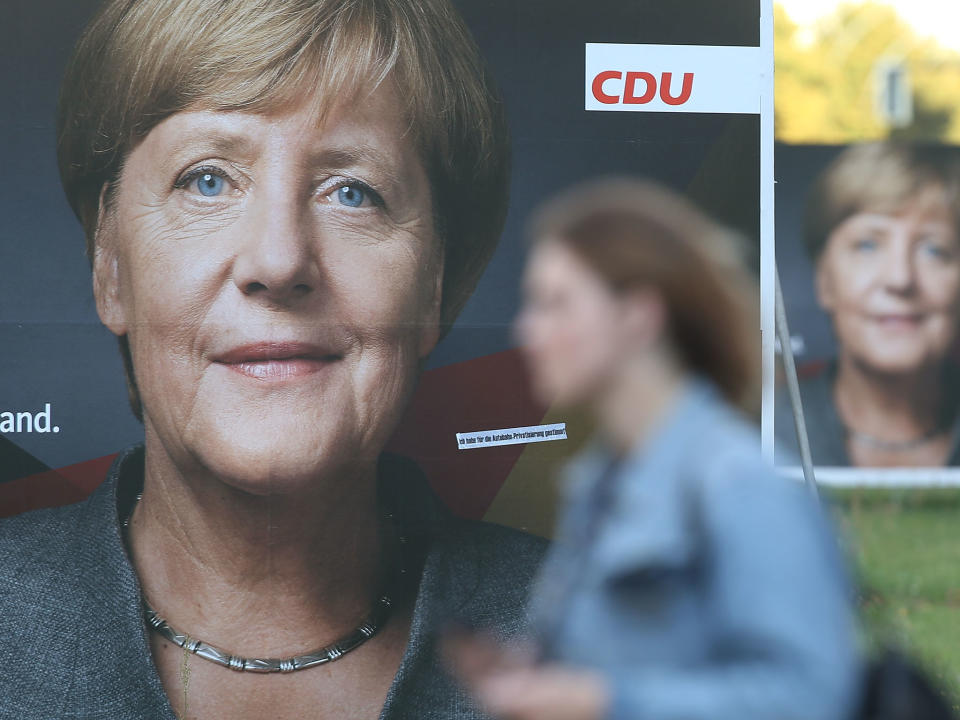Angela Merkel is the world's most powerful woman – so she better start calling herself a feminist

In search of an obvious role model for today’s modern feminist, one should have to look no further than the Chancellor of Germany. On the eve of an election that will almost certainly grant her a fourth term in office, it’s easy to describe Angela Merkel as the ultimate eradicator of gender stereotypes – indeed, of accepted norms altogether.
She’s managed to prove that growing up in East Germany is no barrier to entering West German-dominated politics, and has demonstrated that being a Protestant doesn’t preclude you from leading the traditionally catholic Christian Democratic Union.
She’s shown that a female physical chemist can hold her own in a field dominated by traditionalist – even chauvinist – male lawyers and historians. In a remarkable feat of personal success, she adroitly shed the image of being Helmut Kohl’s “little girl” in the 1990s, surging to power in her own right, and, ultimately, ruthlessly contributing to her mentor’s demise – a savage coup de grace that proved once and for all that she had the backbone to lead the country.
These days, she’s regularly referred to as the leader of Europe and her commitment to the bloc’s “Project” is commendably unshakeable. Her staying power and the consistency of her domestic support is basically unprecedented. She’s fended off a recession and is credited with having introduced minimum wage. She’s overseen the launch of the country’s ambitious Energiewende – or energy transition – and she’s resolutely stood her ground on the world stage. She’s the last person I can imagine holding Donald Trump’s hand.
And yet, although her success should be bulletproof evidence that gender need not play a role in the pursuit of power, she may be failing Germany in an obvious way – and one that could come so naturally to her.
Ever since bursting onto the public stage, childless Merkel has shunned the feminist label and gender politics has idled at the bottom of her priority list. Yes, trying to detract attention from the fact that you’re not a man might have been a winning strategy for women in politics in the 1980s and 1990s, but the world has changed. And so should our attitudes.
Progressive as Germany may be economically and technologically, it’s still a slave to historical institutional sexism and unconscious bias. A failure by the world’s most powerful women to address that is quite frankly depressing.
Remember that statistic about more men named John being FTSE 100 CEOs than women? Well it applies in Germany too (except “John” becomes “Thomas” or “Michael”) but it runs deeper than that and progress has been feeble.
In 2013, Germany’s parliament rejected a law similar to legislation already enforced in other European countries that imposed gender quotas on the supervisory boards of companies. The push for the change came from the centre-left Social Democrats and the Green Party and was blocked by Bavaria’s Christian Social Union, the business friendly Free Democrats, and Merkel’s CDU.
Eventually, in 2015, Germany did pass legislation requiring big corporations to allocate 30 per cent of seats on non-executive boards to women, but females remain grossly underrepresented. Just over 12 per cent of board positions at Germany’s 30 biggest publicly listed companies are currently held by women.
Social expectations that women should give up work to care for children are also much more dominant in Germany than in the UK, for example. There’s a stigma attached to being a working mother, summed up in the still commonly used term “Rabenmutter” – or “raven mother”.
In lower-ranking jobs – at apprenticeship level and a few rungs above – the gender balance is praiseworthy, but climb a little higher and the workforce becomes embarrassingly homogenous: white, middle-aged men whose wives have taken on all domestic responsibilities. Dinner’s on the table when they walk through the door.
Merkel became Chancellor in 2005 so a generation of Germans won’t remember a time when their head of state was not a woman. But between the most powerful job in the country and the lowest level of work is a vast space where women are dramatically outnumbered by men.
During the Nazi era, a woman’s highest calling was thought to be motherhood. Under Hitler, the country reversed practically any gains that women had made towards being treated equally, and while those practices and beliefs have obviously – and thankfully – been consigned to the history books, an essence of them may well have survived.
The term “feminist” still carries very negative connotations. It conjures up an image of bra-burning protesters, enraged to the point of violence at the male-led institution, something that few who simply believe that the sexes should be treated and paid equally, would necessarily want to identify with.
Angela Merkel may have little in common with Alice Schwarzer, the iconic journalist who became an icon of contemporary feminism when she founded the magazine Emma – derived for the German word for emancipation – more than four decades ago. But the one thing the two women both have is a platform to be heard.
In her next term, Merkel has the opportunity to help feminism go mainstream. With 12 years of chancellorship under her belt and a robust and enduring support base, she no longer has to worry about alienating members of the public. She should be over that.
Despite her “Mutti” (“Mummy”) nickname, Merkel is known in Germany for being private, emotionless and playing with cards close to her chest. Last month centre-left rival candidate Martin Schulz even called her aloof and out of touch.
Addressing an issue that keeps women in Germany up at night won’t soften her credibility. But it could be an easy way for her to enhance an already unrivalled legacy, especially among the voters of tomorrow, feminist icon or not.

 Yahoo News
Yahoo News 